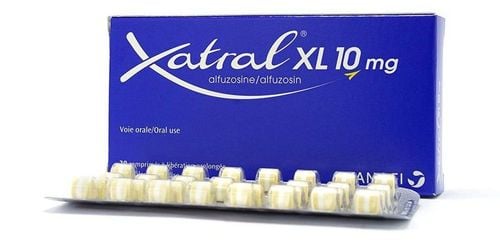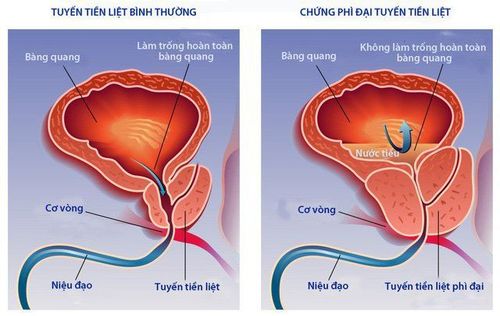This is an automatically translated article.
The article is professionally consulted by Master. Doctor Hoang Tho, urologist at Vinmec Times City International Hospital.Prostate cancer is a common disease in men. In the early stages of prostate cancer, there are no obvious symptoms, making it difficult to detect. The PSA test is a way to detect prostate cancer in its early stages. PSA is considered a breakthrough in the detection and treatment of prostate cancer. So what is the PSA index? What is the significance of the PSA test in the treatment of prostate cancer? Follow the article below to understand this issue better.
1. Basic information about PSA
PSA is a prostate-specific antigen encoded by the KLK3 gene. PSA is secreted from the epithelial cells of the prostate gland and has a molecular weight ranging from 30,000 to 34,000 daltons.Most PSA in the blood is bound to plasma proteins. Only about 30% of the free PSA is not bound to proteins. These free PSAs are not capable of breaking down proteins. This is why PSA is considered a marker of prostate cancer.
The ratio of free PSA to total PSA is used to diagnose prostate cancer if the free PSA level is in the range of 4 - 10 ng/ml. If the free PSA/total PSA ratio is less than 15%, the risk of prostate cancer is very high.
2. When should a PSA test be performed?
In fact, not everyone gets a PSA test. This method is only applicable in some special cases. Specifically:
When wanting to be screened for prostate cancer: Men aged 50 and over should have a PSA test every year to screen and detect the disease early. Men with a family history of prostate cancer should also have prostate cancer screening from age 40 onwards. The PSA test is used to monitor the effectiveness of prostate cancer treatment as well as the risk of recurrence. Depending on the severity of the disease, the PSA test should be monitored after 6 to 36 months of prostate cancer treatment.

Thực tế, không phải ai cũng được thực hiện xét nghiệm PSA. Phương pháp này chỉ được áp dụng trong một số trường hợp đặc biệt
3. PSA and Prostate Cancer Risk Warnings
For normal people, the total PSA in the blood will be very low (less than 4 ng/mL). However, as you age, the size of your prostate gland increases.
PSA is a marker of prostate cancer . Specifically as follows:
When blood PSA levels are high, men are at increased risk of prostate cancer. The cut-off value for prostate cancer diagnosis is the total plasma PSA index ≥ 4 ng/ml, the specificity is about 91%, and the sensitivity is about 21%. When you have prostate cancer, the rate of increase in total PSA in the blood will increase faster than normal. Men with a total PSA elevation of 0.75 ng/mL/year or more have a higher risk of prostate cancer. Those with PSA elevation < 0.75 ng/mL/year have an increased risk of benign prostatic disease. However, not every elevated PSA level in the blood means prostate cancer. Some other medical conditions can also lead to increased PSA levels in the blood such as: prostatitis, benign prostatic hypertrophy, urinary retention requiring urethral catheterization...
Therefore, to diagnose More accurately than prostate cancer, patients need to measure the free PSA index and the free PSA/total PSA ratio.
In fact, the determination of the free PSA/total PSA ratio helps to diagnose and differentiate effectively cases of prostate cancer.

Việc xác định tỷ số PSA tự do/PSA toàn phần giúp chẩn đoán và phân biệt hiệu quả những trường hợp bị ung thư tiền liệt tuyến
In particular, about 23% of patients with prostate cancer have a free PSA/total PSA ratio ranging from 0.15-0.19. Approximately 9% of patients with prostate cancer have a free PSA/total PSA ratio ≥ 0.20.
To protect health, men, especially those aged 50 and over, need to be examined and carried out the necessary tests to detect and treat prostate cancer effectively.
Testing is an essential step in the process of diagnosing and treating patients. Therefore, the laboratory department at Vinmec International General Hospital is fully equipped with modern and synchronous testing equipment and at the same time applies operating procedures according to international medical standards to provide testing services. Experience: "Accurate, timely, objective and reliable" brings the perfect choice of top health care for people.

Hệ thống máy xét nghiệm tự động tại Bệnh viện Đa khoa Quốc tế Vinmec đảm bảo trả kết quả nhanh
With this model, Vinmec has transformed from a traditional surgical/treatment model to a comprehensive, comprehensive surgery/treatment model. Combination of minimally invasive methods, bringing a positive change in the treatment of prostate diseases (Each treatment method has its own advantages and disadvantages) including:
Prostate cancer surgery paralyzed by robot. Treatment of prostatic hypertrophy with Bipolar knife. Biopsy detects prostate cancer by special method, shortens time and increases biopsy efficiency.

Mổ nội soi tuyến tiền liệt bằng robot tại bệnh viện ĐKQT Vinmec














